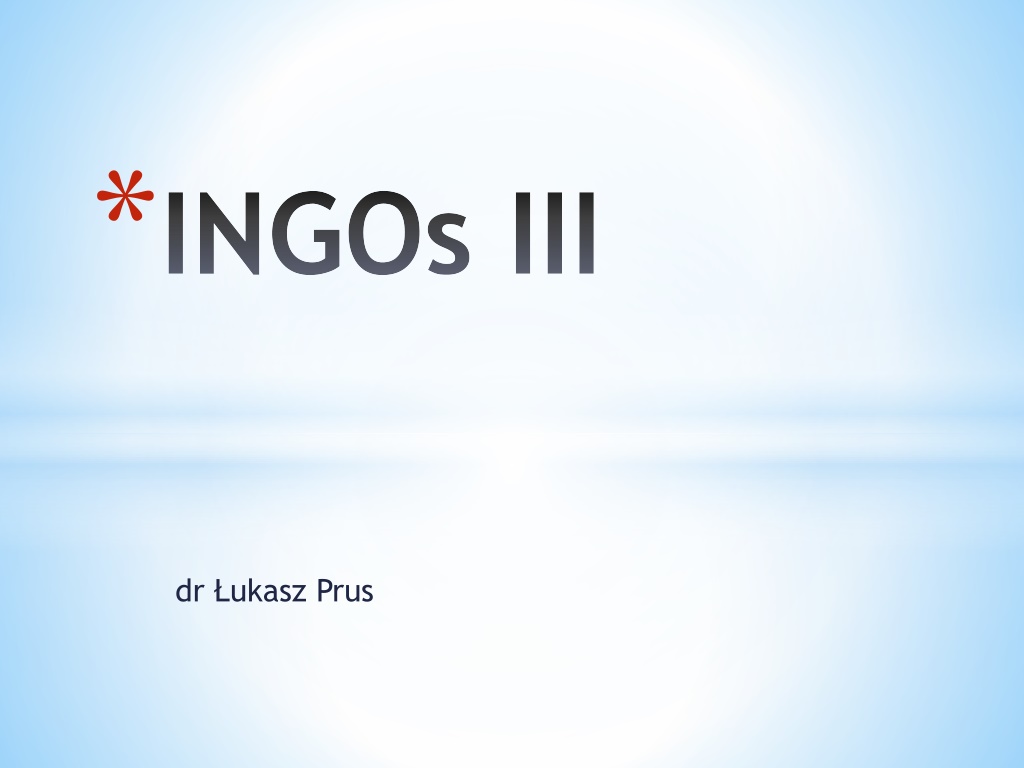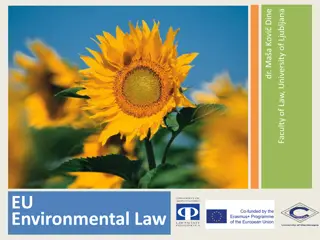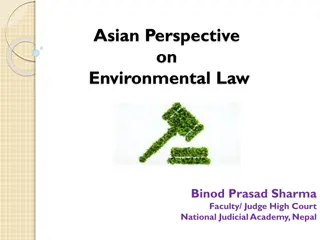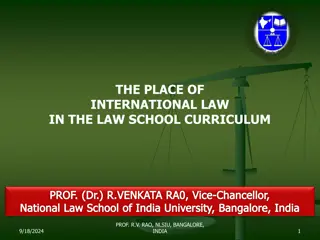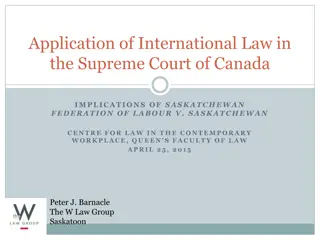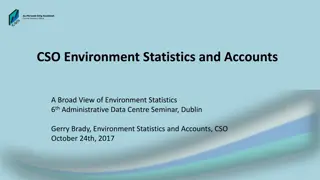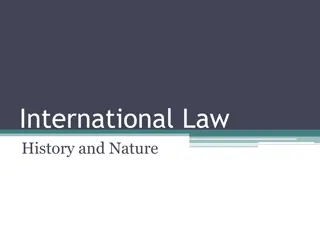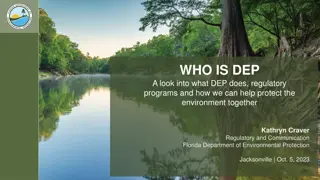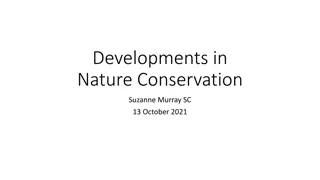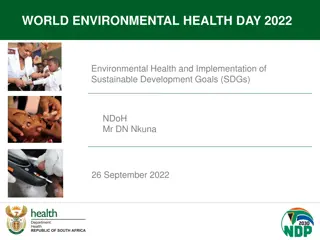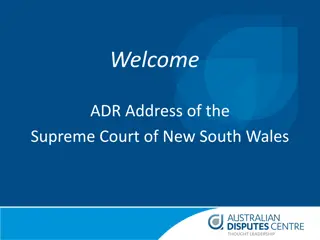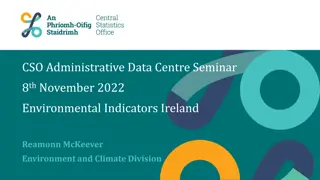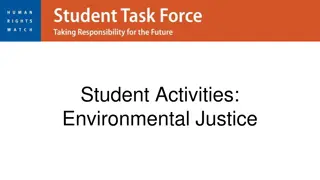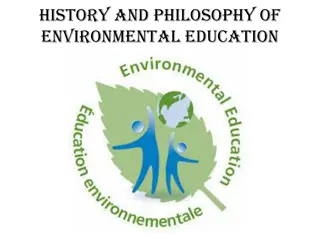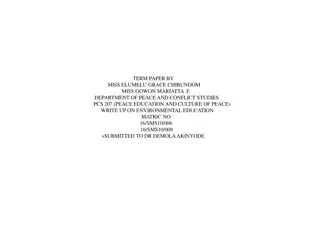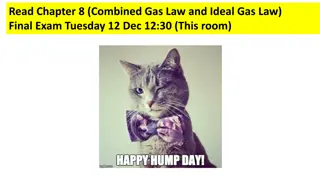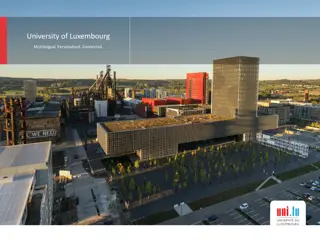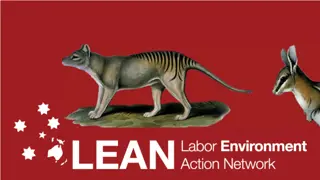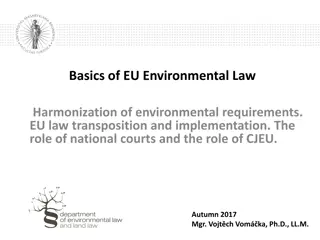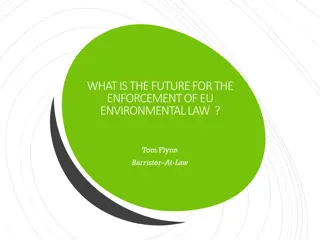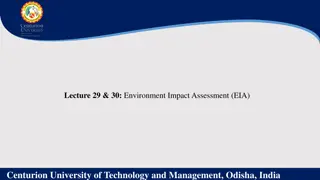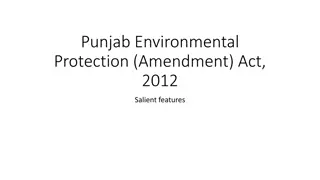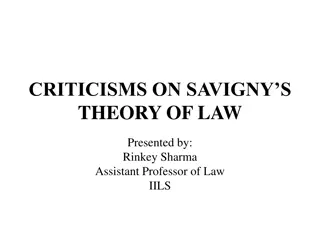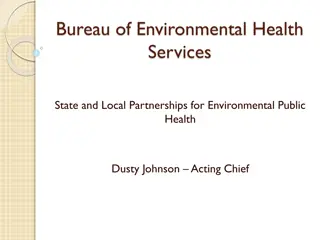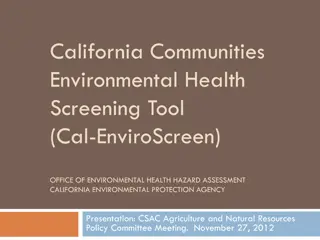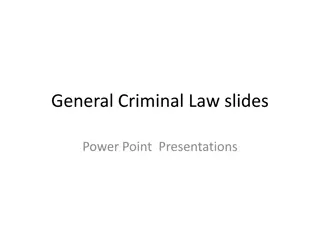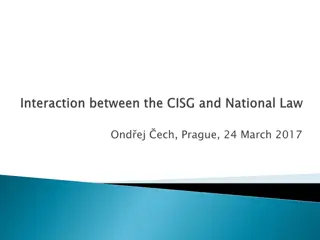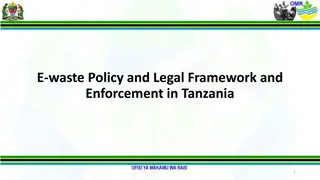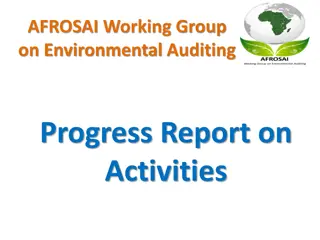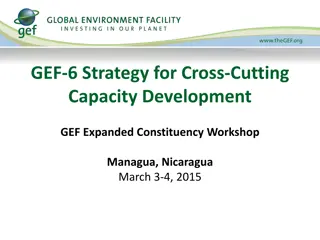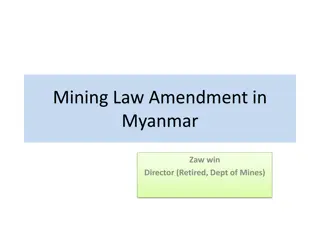Role of Environmental INGOs in International Law Development
Non-state actors, particularly Environmental International Non-Governmental Organizations (EINGOs), have played a crucial role in developing international environmental law over the past few decades. INGOs emerged due to government inaction in addressing environmental degradation, mobilizing public opinion and advocating for progressive legal frameworks. They lobby, collect data, influence law, and monitor compliance, enhancing their power through globalization to drive effective environmental actions.
- Environmental INGOs
- International law development
- Non-state actors
- Environmental protection
- Globalization
Download Presentation

Please find below an Image/Link to download the presentation.
The content on the website is provided AS IS for your information and personal use only. It may not be sold, licensed, or shared on other websites without obtaining consent from the author. Download presentation by click this link. If you encounter any issues during the download, it is possible that the publisher has removed the file from their server.
E N D
Presentation Transcript
*INGOs III dr ukasz Prus
*Non-state actors *Environmental International Non- Governmental Organizations *EINGOs 2
*Non-state actors/EINGOs have played a central role in developing international environmental law *Since the latter half of the nineteenth century, *The scientific community and then EINGOs have mobilised the forces of public opinion and *have sought to the progressive development of international law. 3
*Over the past few decades, 6 categories of non-state actors have emerged as important actors: *The scientific community *Non-profit-making environmental groups (NGOs and INGOs) *Private companies *And business concerns *Legal organisations *Academic community 4
*EINGOs emerged due to frustration with *governments lack of initiative to address *the extent of environmental degradation *In past two decades, INGOs have developed scientific expertise and lobbying skills 5
*EINGOS *They can lobby (eg. FAO, WHO) *Collects data *seek to influence law *Identify issues requiring international legal action (water/air pollution, waste management) *They participate as observers in international organisations *And in treaty negotiations 6
*Monitor compliance with environmental law *pay media attention for environmental protection *Exposing environmental harm *INGOs act outside institutions to mobilize public opinion *Globalization may enhance the power of INGOs to mobilize effective consumer actions 7
*INGOs act as watchdogs in the process of adoption and implementation of international environmental law. *They participate, formally and informally in the international implementation of principles and rules adopted at the regional and global levels *During the negotiations for the Kyoto Protocol, more than 200 NGOs were accredited as observers 8
*INGOs sometimes form alliances among themselves and *with intergovernmental organizations *to help implement international environmental law 9
*In 1988, *UN Environmental Programme *the World Wide Fund for Nature (WWF) *And International Union for Conservation of Nature *Formed the World Conservation Monitoring Center to collect and provide information services on conservation *and sustainable use of biological resources. 10
*EINGOs may be able to participate in dispute settlement procedures either *As parties *Or as amicus curiae (friend of the court - someone who is not a party to a case, but who assists a court by offering information that bears on the case 11
*In the U.S. shrimp/turtle case at the WTO, *INGOs briefs initially were attached as exhibits to the U.S. submission, *But a revised version of one of the briefs was submitted independently by a group of NGOs *and was accepted by the panel *Despite protests of some governements 12
*Examples of EINGOs *Greenpeace * World Wide Fund for Nature (WWF) *Green Cross International *Friends od the Earth *Green Actors of West Africa (GAWA) *Water For People *Earthwatch Institute *ClientEarth *Forest Stewardship Council *Rainforest Alliance *Rainforest Foundation Fund *Rainforest Trust
*International Union for Conservation of Nature *Founded in 1948, the International Union for Conservation of Nature (IUCN) is the world s oldest and largest global environmental organisation. *In the past, it has been called the International Union for Protection of Nature (1948-1958) *And the World Conservation Union (1990-2008)
*What is IUCN? *International organization working in the fielf of nature conservation and *sustainable use of natural resources *An orgnisation with hybrid membership: *80 States *115 Agencies *850 NGOs
*Mission is to influence, assist societies the world to conserve nature and to ensure that any use of natural resources is equitable and ecologically 18
*the International League for Human Rights itself was responsible for establishing in New York the Lawyers Committee for Intentional HR, *now known as the Lawyers Committee for Human Rights *Another of the more important INGOs, in 1975 *the Lawyers Committee for Human Rights claims promote the HR standards contained in the International Bill of Rights 20
*The New York-based Human Rights Watch *Human Rights Watch was founded by Robert L. Bernstein *as a private American INGO in 1978, *under the name Helsinki Watch, to monitor the Soviet Union 21
*HRW has developed into the most dominant American INGOs working to expose violations of basic liberal freedoms *HRW publish reports on HR abuses US or other countries 23
*Two other leading HR INGOs are located in Europe *In the UK and Switzerland *The Geneva-based International Commission of Jurists (ICJ) *was founded in 1952 to promote the rule of law throughout the world 25
*The ICJ has been accused of being a tool of the West in the Cold War, *Spending considerable resources exposing the failures of Soviet bloc. *The ICJ was initially funded by the Central Intelligence Agency. *The ICJ was established following the 1952 International Congress of Jurists in West Berlin. 27
*The Congress was organized by the Investigating Committee of Free Jurists (ICJF) , *a group of German jurists committed to investigating human rights abuses carried out in the Soviet Zone of post-war Germany *One of the founders Dr. Walter Linse was arrested by East German intelligence agents and delivered to the KGB. *Today it is regarded as a bona fide INGOs, concerning with rule of law questions in the South 28
*Last but not least *The London-based Amnesty- International (AI), *The most powerful HR INGOs *Is today synonymous with the HR movement and has inspired the creation of many similar HR groups around the world 29
*It was lunched by Peter Benenson, a British lawyer, writing in the May 1961 issues of the Observer and Le Monde * Forgotten Prisoners *The recipient of the 1977 Nobel Peace Prize, AI claim that its object is to contribute to the observance HR *Through campaigns to free prisoners of conscience 30
*To ensure fair trails within reasonable like for political prisoners, *To abolish death penalty *Torture *And other cruel treatment of prisoners 31
*Prisoner of conscience is a term coined by Peter Benenson in a 28 May 1961 article ("The Forgotten Prisoners") for Observer *This term can refer to anyone imprisoned because of their race, sexual orientation, religion, or political views. *It also refers to those who have been imprisoned and/or persecuted for the non-violent expression of their held beliefs 34
*HR INGOs methods Why HR INGOs may have impact: they do not make political decisions INGOs are responsible before the society and their sponsors INGOs are transmitter of views of the society and minority to the government Most important features of INGOs dealing with human rights Credibility Public trust and confidence Responsiveness Independence Dynamism 36
Depending on mission and scope of operation HR INGOs use different methods in order to protect human rights. Traditionally and basic methods Investigation Monitoring Advocacy Strategic litigation Education 37
*Investigation usually takes place in a Third World country, *while monitoring (reporting) and advocacy aim at reforming policies of industrial democracies and intergovernmental agencies to trigger bilateral and multilateral action against the repressive state. 38
*Some HR INGOs now go beyond this denunciatory framework * and work to foster and strengthen processes and institutions *rule of law, and constitutions, judiciaries, legislatures, and electoral machineries that ensure the protection of civil and political rights. 39
*Although the ideological commitment of these INGOs seems clear through their mandates and work, they nevertheless cast themselves as nonideological *For example, AI refused to condemn apartheid as a political system or to adopt Nelson Mandela, the century s most prominent prisoner, as a prisoner of conscience 40
*HR INGOs role of watchdog *controlling the government and other institutions (also private institutions) *Watchdog organizations are non-profit groups that view their role as critically monitoring the activities of governments or other organiztions *and alerting the public when they *detect actions that go against the public interest 42
*Monitoring: *Day to day monitoring (e.g. freedom of speech) *Controlling compliance with certain standards (e.g. controlling prisons in certain area) *Preparation of reports on compliance with human rights on the basis of monitoring *Results: *reports, *interventions, *raising awareness, *accountability *Examples: HRW report on violations of human rights in Russian-Georgian conflict 43
*Purposes of monitoring *to help people (monitoring + intervention) *to have independent data and be a source for media *to compel (enforce) the government to change the law or practice *to show violations to international community (e.g. cluster ammunition in conflict in Georgia) *or prepare reports to international bodies (e.g. EU, UN, Council of Europe) 44
*Barriers to monitoring *Sometimes need of cooperation with government (e.g. controlling prisons) *Serious monitoring requires human resources, time and money *You cannot expect results immediately it is rather long-term investment *Monitoring in conflict zones may be risky *Sometimes HR INGOs may need a special status at a certain international organization, e.g. consultative status at the Council of Europe 45
*Advocacy means arguing on behalf of a certain issue, idea or person *Changing the attitude of government *Showing the problem *Convincing the society *Advocacy means fighting for something, but without an intent to be elected for public position 46
*Example of advocacy *Cluster Munition Coalition *is an international coalition working and campaigning against the use and production, *Cluster munitions are a type of explosive weapon *Methods: *Signing letters and petitions *Building international coalitions *Informing the public opinion on the problem 47
*Convincing famous persons to support activities *Public events and protests *Organization of conferences and other events *Engaging people into actions 48
